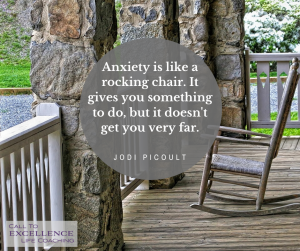
For the first few weeks of the COVID-19 crisis, as restrictions began rolling out and normal life became a thing of the past, I found it really hard to stay focused. Even though I wrote a blog post on seeing shelter-in-place as an opportunity and I had a list of projects I personally wanted to get done during this break from routine, when the time came to actually work on those things, my brain didn’t want to cooperate.
I checked the news sites at least every hour to see the latest updates (or even better, Facebook, to see if anyone else had found news I hadn’t), and my blood pressure spiked with every article I read. I spent my days ruminating over every mistake, past, present, and future, getting angrier and more frustrated every day.
I spent hours searching the internet to see if I could find any online stores that still had hand sanitizer or toilet paper (I was way behind the curve and it was already long gone). I burned an excessive number of brain cells strategizing how to find toilet paper, and what I could use as a replacement if I ran out (even though I had – and still have – plenty).
I worried about how this crisis was going to impact the work I had lined up over the summer and into the fall, most of which involved live meetings. I leap-frogged over any rational solutions, should the most catastrophic scenarios unfold, and lost several nights’ sleep debating the merits of working at McDonalds versus Starbucks versus 7-11 (interestingly, I had these same internal debates when I thought I would never get out of graduate school…).
The fear-center of my brain was spinning out of control. I suspect everyone out there has their own personal set of fears and worries that have been triggered by the COVID-19 crisis, along with anxieties and overwhelm from trying to cope with an unpredictable situation that has no easy solution and no end in sight.
It’s completely normal to experience a wide range of emotions during a crisis of this magnitude. It’s not surprising that the survival-oriented parts of our brain take over. But staying stuck in that zone isn’t helpful.
It doesn’t matter whether you want to use this time to work on a dream project, or whether you just need to figure out how you’re going to pay this month’s bills and put food on the table – when the more primitive midbrain takes over, it shuts down access to the cortex, the higher part of our brain that manages rational thought and creativity. That means our ability to solve the very problems causing our distress is reduced, and this can lead to a vicious downward spiral.
Now, you’re probably familiar with the old stand-by remedies for stress – exercise, deep breathing, meditation and/or prayer, etc… – and there are already plenty of great articles on those. In this post, I want to focus on a few strategies that are more specific to this time of COVID-19.
Turn Off the News
This is a critical first step, and maybe the hardest if you’re a news junkie like me. But there’s a saying in journalism, “If it bleeds, it leads.” Journalists are trained to come up with headlines (and stories) that stand out and grab our attention – the worse, the scarier, or the more shocking they can make something sound, the more people who will read or watch. That’s not hard to find or do these days. But every time you read or hear a story like that, it’s just firing up your amygdala (the brain’s fight-or-flight command center) even more.
So, for your own sanity, limit your news intake (as well as sources of negativity on social media). Choose a trusted source and check in once a day to see if anything in your city or world has changed that requires a response from you. Then go back to your life. If you had a case of food poisoning from eating bad potato salad, you wouldn’t keep eating the potato salad…
Identify What You Can and Cannot Control
Remember the Serenity Prayer?
God grant me the serenity to accept the things I cannot change, courage to change the things I can, and wisdom to know the difference.
This next exercise is about developing that wisdom. First, take out a piece of paper, and label one side “Things I can do something about” and the other side, “Things beyond my control.” Then, start thinking about the things you’re worried or upset about, and write each one down under the appropriate category on your paper. Keep this paper with you for the next day or two, and as new concerns pop into your mind, add them to your lists.
Now, the results probably won’t be surprising – but there’s something powerful about the process of writing them down and seeing them in black-and-white. It makes things more concrete.
For example, some of the things I have no control over: the number of people who will get sick with COVID-19, and the number who will die; the restrictions put in place or when they will be lifted; how well other people follow these guidelines; the impact of this crisis on the economy; and the upcoming election.
Now, in my head, I’ve always known I have no control over these things, but that didn’t stop me from ruminating about them day and night. But somehow, the act of getting specific and writing them down has really helped me to let them go when I see or hear a story in the news on one of these topics. It is what it is, and it will be what it will be – all I can do is manage my responses…
Which brings us to the other list – what we can control.
For me, I can control the measures I take to keep myself and those around me safe; my food and exercise choices; my writing; doing my part to share positive news and helpful information; my efforts to connect with potential clients; and developing skills that will put me in a better position when things finally begin to return to normal.
Once you have a list of the general areas over which you have some control, take it a step further and begin to outline specific actions you can take for each one.
This exercise has really helped me become more conscious of where I’m spending my mental energy. When I find myself going down a rabbit hole of unproductive anger or worry, I pull out my lists and acknowledge where the topic belongs. Then I look at my list of what I can control and pick something to act on right then. If I do continue down the rabbit hole, I recognize it for what it is: a conscious choice to fritter away my time and energy.
Reframe Your Thoughts and Language
The words we speak, whether inside our head or out loud to others, have a massive impact on our emotions. Research by psychologist Sonja Lyubomirsky suggests that approximately fifty percent of our happiness is determined by our circumstances, attitudes, and actions (as opposed to genes or temperament, which comprise the other fifty percent). We don’t always have control over our circumstances – like during this pandemic – but we do have control over our attitudes and actions. And one of the most important mental shifts we can make in any situation to reduce our anxiety and increase our happiness is reframing the situation in a more positive light.
One simple way to start is by changing the way we talk about the situation. Instead of saying “I’m stuck at home,” we can say “I’m safe at home,” or “I’m keeping others safe by staying at home.” Instead of “I’m not allowed to do X, Y, or Z,”, change it to “I’m choosing to support my community by following the guidelines.”
Another key is shifting our perception of the situation from a threat to a challenge. Our brains react differently depending on how we see a specific event or circumstance. For example, standing on the edge of a steep cliff paralyzes me because I see it as a threat to my existence, while a rock-climber feels exhilarated because they see it as a challenge to be conquered. And seeing something as a challenge rather than a threat gives us access to the more creative solution-finding parts of our brain.
So how can we make the shift about a global pandemic and the different ways it affects our individual lives? One idea is to pretend you’ve been cast as the hero in a movie, and the plot consists of all of the obstacles this crisis has thrown at you. Think about your favorite movies – the bigger the obstacles, the more the hero has to overcome, the better the movie. So, life is giving you the chance to star in a blockbuster right now!
How would a fictional hero respond to the challenges you are facing personally? At the start, they might have a meltdown or two, but then they would start to discover their inner resilience and draw on their skills and strengths to outwit and defeat the “enemy.” They would persevere and overcome all of the obstacles in their path. And in the end, they would win.
So, step into the role. Know that even if you don’t believe it right now, you’ve got the right stuff. Everything you need is waiting for you to uncover it.
Become the hero in the movie of your life.
Immerse Yourself in a Project with a Clear Beginning and End
I’ve found that doing something creative that requires my full attention gives my brain a break from the worries of the world. Part of it is flipping the switch from thinking with the logical left brain to the creative right brain, and part may have to do with shifting from more hyper beta brain waves to the more relaxed alpha waves.
But then I read this article on Thrive Global (The Real Reason Hobbies Like Baking and Puzzles Calm Our Coronavirus Stress), and learned that in times of crisis with no clear timeline, working on a project that has a definite beginning and end can also give us a sense of completion that provides psychological comfort and satisfaction. It gives us back a sense of control.
The key is to pick projects that are relatively small, that you can finish in a reasonable amount of time. Clean out a closet, bake a cake, work a puzzle, knit a scarf. And don’t forget to celebrate your accomplishment when you’re done!
Talk It Out
I was shocked when I saw a post on Facebook recently about disrupted sleep patterns, and saw how many people were experiencing the same thing. I thought I was the only one. Seeing that post helped me realize that my reactions are normal. I felt better.
When you start to feel overwhelmed with anxiety and worry, reach out to a friend or family member and share what you’re going through. There’s an amazing power in simply sharing our stories with someone who can relate and empathize, and right now, those people are not too hard to find. This crisis is affecting everyone in some way. You don’t have to go through this alone.
If these strategies aren’t enough and you still find yourself overwhelmed by anxiety and worry, please don’t hesitate to reach out for professional help. Unless you’re old enough to have lived through World War II or the Great Depression, we’ve never experienced a disruption to daily life of this magnitude. Here in Dallas, they’ve set up a special Metrocare Health Line (214-743-1215) to help connect residents with mental health resources. More broadly in Texas, the Health and Human Services Commission has set up the COVID-19 Mental Health Support Line at 833-986-1919, where you can talk to a mental health professional for help dealing with stress, anxiety, or depression. On a national level, you can check out the NAMI (National Alliance on Mental Illness) website (www.nami.org), which also has information and a helpline where they can direct you to more resources.
Your Turn
These are just a few strategies for coping with COVID-19-related anxiety. What are you doing to overcome the stress and handle uncertainty? Share your ideas in the comments below!







8 thoughts on “Five Strategies for Coping with COVID-19-Related Anxiety and Stress”
All great suggestions. These are unchartered waters for most of us, so it is really helpful to share, realize we are all going through this, and pick up a few tools. Thanks!
Thanks Cindy! As you said, this is a new unprecedented experience for most of us, and the more tools we have in our toolbox, the more likely we are to find one that works for our individual situation 🙂
Your advise is right on target and much appreciated. I’m getting ready to make my list. Keep up the great work. Thanks!
Thanks Daphne! I find that making the lists of what we can and cannot control is the most helpful tip on this list – I have to refer to it every day to remind myself to stay focused on my lane, and when I do it has been a sanity saver 🙂
Great article! I didn’t realize I was already doing a couple of these strategies. Limiting the news is key for me as is my view on being sheltered at home because it does allow me to stay positive. Fortunately I also have a work from home business so I’m able to focus on helping others and not on circumstances I cannot control.
Thanks Elva! Keeping a positive mindset is crucial these days, and it’s very reassuring that you’ve also had success with these strategies. And you are taking a page from the Dalai Lama and the Archbishop Desmond Tutu as far as helping others – this is one of the pillars of mental resilience and being able to find joy no matter what the external circumstances may be 🙂
Great article. Love the analogy of the potato salad. Good reminder too to simply write it down. So interesting that even though I’ve experienced the power of this, I forget and try to do it in my head. Writing it down really works.
One tactic that helps me is to focus on what’s coming from me rather than what’s coming to me. Tend to my own energy, my appreciation for life and the people in it.
Together we will move through this. Thanks for another great post. ❤️
Thanks Yvon! That’s great advice about focusing on the energy we put out, rather than just what’s coming at us. I’ve been trying to do more of that too, finding ways to put out positivity and be a point of light. The funny thing is, the more we try to light our little corner of the world, paradoxically the better we ourselves feel 🙂